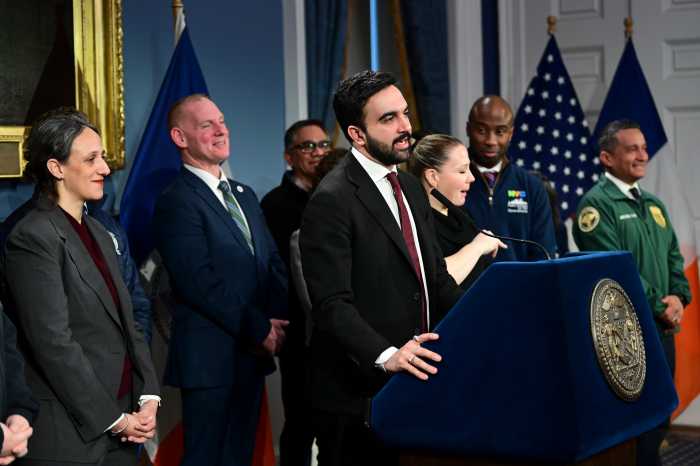
Wearing blue jeans and an oversized hoodie sweatshirt, Nassau County Executive Ed Mangano sits at the head of a long oval table in a conference room at the Theodore Roosevelt Executive & Legislative Building in Mineola and pounds its shiny surface with his fist.
Flanked by his Senior Policy Advisor and Communications Director Brian Nevin, Director of Governmental Research Eden Laikin and Deputy County Executive for Finance Tim Sullivan, Mangano is doing his best to convince Press reporters that his 2011 budget is balanced and that he and his administration are the subjects of a calculated political conspiracy to get him to raise residents’ property taxes, a secret plot perpetrated by Democrats.
“Why are they here!?” he implores, striking the table several more times. “Here’s the question: ‘Why are they here!? Why!?’ No one can answer it.”
By “they,” Mangano means the six board members of the Nassau County Interim Finance Authority, commonly referred to as NIFA—a New York State watchdog agency created in 2000 to monitor and oversee the county’s finances following the administration of Republican County Executive Tom Gulotta, who left Nassau on the brink of bankruptcy. Last month, they unanimously voted to impose a “control period,” effectively seizing authority over the county’s fiscal operations, based on what NIFA identified as a $176 million potential deficit in the $2.6 billion budget for 2011. According to NIFA, it must do so when “there exists a substantial likelihood and imminence [of the county] incurring a major operating funds deficit of 1 percent or more.”
Mangano, who beat out Democratic wunderkind Tom Suozzi for the county’s top spot in a hair-splitter election in 2009—winning by a mere 400 votes—is no stranger to the group. A series of scathing NIFA reports condemning the financial plans and risky budgetary practices of his predecessor were bedrock centerpieces of his campaign and the source of his vitriolic rhetoric along the campaign trail. In fact, following Suozzi’s concession speech after a long recount that December, the NIFA reports were prominently displayed on Mangano’s desk beneath a crystal ball-shaped paperweight during his first interview to media outlets.
Now, that scene couldn’t be any more prophetic—or ironic.

NIFA’s Jan. 26 coup d’état made headlines across the country, not the least reason being Nassau’s stature as one of the wealthiest counties in the nation, nor the fact that Mangano, a Republican, is considered a Tea Party candidate, since he also ran on the Tax Revolt Party line. The self-professed fiscal reformer has quickly been branded the poster child of bad financial planning—or merely the latest casualty gobbled up in the fiscal quicksand of the country’s cash-strapped local municipalities. His administration’s been buffeted ever since.
On Jan. 31, Mangano stoked the controversy by filing a lawsuit in state Supreme Court to block the NIFA takeover, asserting the move was unconstitutional. Patrick Foye, Mangano’s chief deputy county executive for finance, resigned the same day in protest. There’ve been public political jabs back and forth, with Peter Schmitt (R-Massapequa), presiding officer of the Nassau County Legislature, and Minority Leader Diane Yatauro (D-Glen Cove) holding dueling press conferences to bash each other—and Schmitt recently telling the Press he’s “going to enjoy hitting [NIFA members] on the side of the head with a baseball bat.”
Yet the battle’s only just begun. Mangano stresses he has no control over what other elected officials say, including members of his own party. But he vows he’ll fight to the bitter end to prove NIFA’s hijacking had nothing to do with Nassau’s finances at all, but rather, everything to do with politics—with the ultimate goal the smearing of him and his party, and forcing his hand to raise property taxes, an act many deem political suicide, especially during tough economic times and something he swore to residents he’d never do. To boot, NIFA’s action could overshadow strides his administration has made in coping with what is truly the $1.3 billion monster in the room fueling all of Nassau’s past, present and future fiscal woes—its broken property-tax assessment grievance system, which hemorrhages $100 million annually. To begin fixing that problem Mangano has had to end Nassau’s being the only county in the state that pays school districts’ share of tax challenge settlements. The fix, known as the “County Guarantee,” was approved by the legislature but is expected to face further legal challenges as future tax bills come due.
The stakes are high. NIFA’s takeover, perceived as justified or not, is already the equivalent of a political nuclear bomb for the politicians left holding the bag during such a period, namely Team Mangano. Locally, NIFA’s commandeering could cost his party control of the legislature in an important election year this November—a redistricting year, wherein legislative districts are redrawn by the party in power. Of course, underlying all of this is the fiscal health of Nassau County taxpayers—who already pay the second-highest property taxes in the nation.
“We did it,” asserts Mangano, regarding his four campaign promises: repealing a 2.5 percent home energy tax imposed under Suozzi, addressing the assessment system, cutting wasteful spending and creating jobs and opportunities. “We did it and created a surplus. We made the county better. This year, we’ll add money to the fund balance. Now, they’re concerned in ‘11. I put forth a budget that is definitely balanced.”
“Politics is a blood sport at times,” he adds, dryly. “They don’t want me to succeed. And sadly, they don’t want me to succeed at the expense of the people and the businesses that operate here in the county.”

































